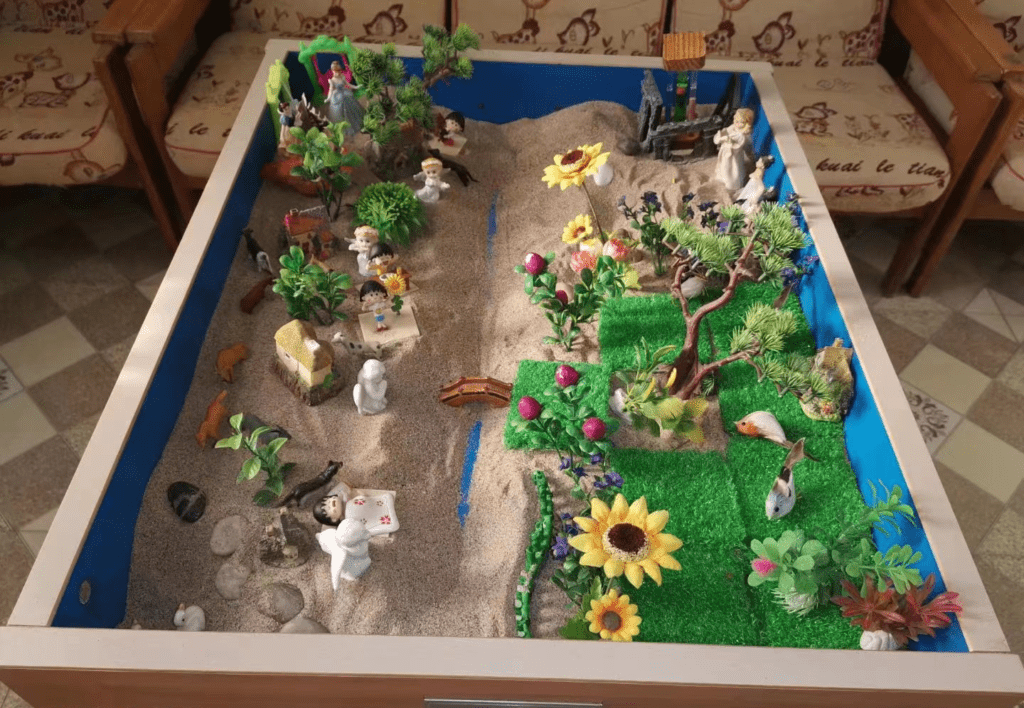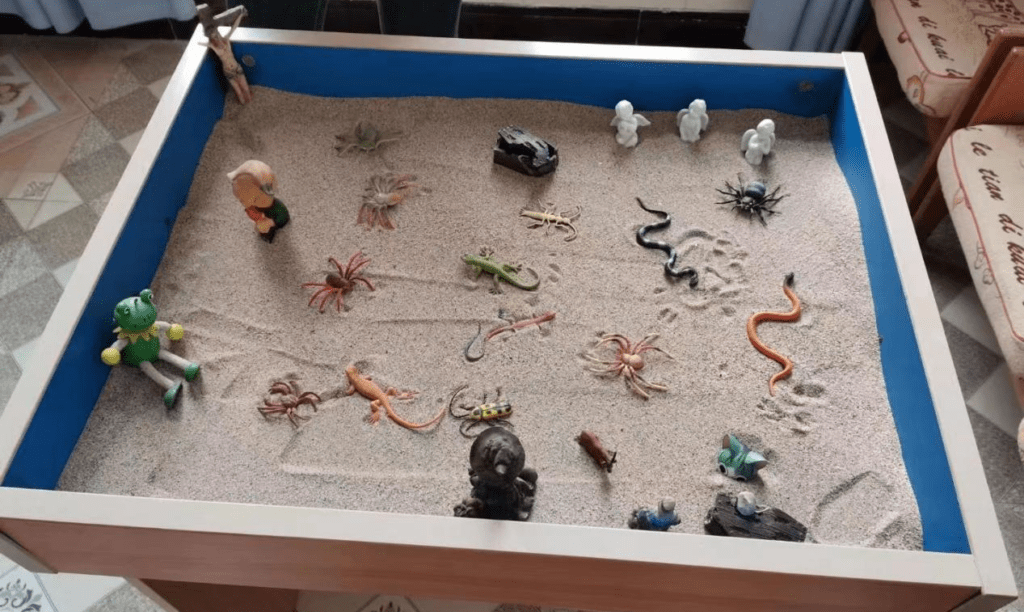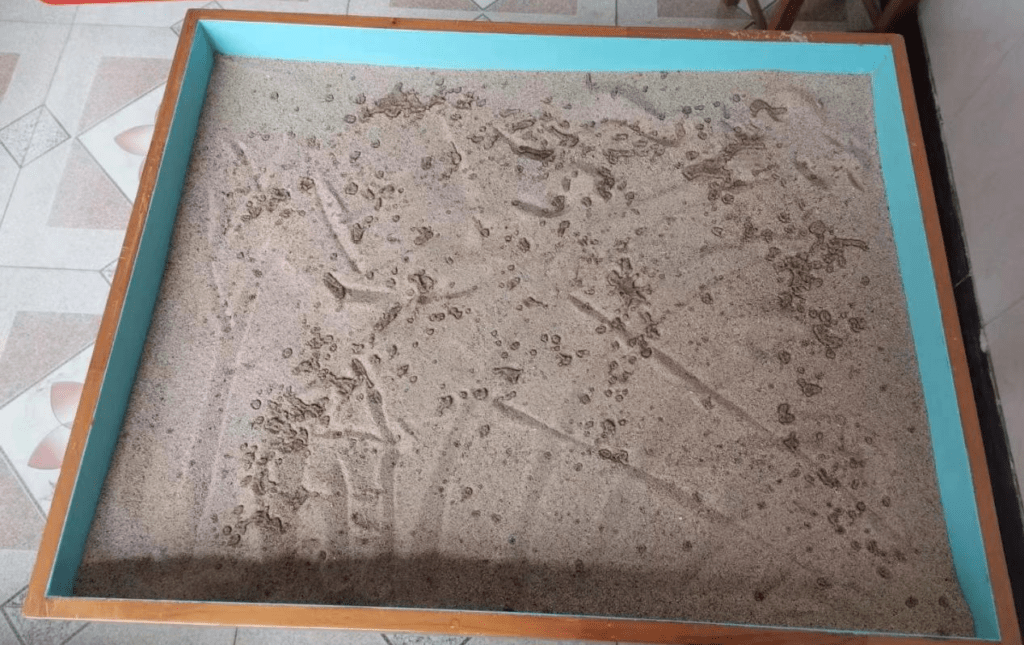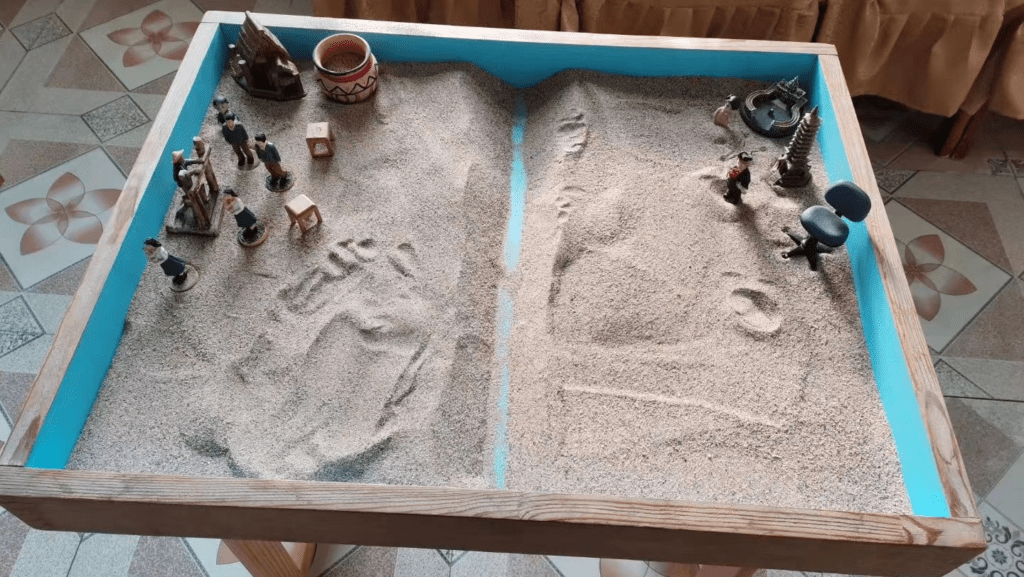In this article, psychology student Wangyouxiang Cheng details his sandplay work with orphans and left-behind children.
Researcher Bio:
Wangyouxiang Cheng, Brandeis University-Art and Science School student, major in Psychology, class of 26. Cheng received initial training as a psychological counselor in China, and can skillfully use sand tables to psychoanalyze and guide clients. Cheng became a volunteer in 2022 after obtaining permission from the Chinese public welfare project “Garden of the Mind”. In 2023, Cheng participated in the Heart Garden project’s public welfare activities in Henan Province, helping a left-behind child get rid of psychological problems and successfully enter high school to continue his studies.
Background:
My mother is a registered psychological counselor and sand table analyst in China. At present, she is following the association of Teacher Yang Yan (Xinxiang City Psychological Counselors Association) to conduct psychological counseling for orphans and left-behind children in maternal and Child Health Center and Sun Village. The main means of counseling is to evaluate the psychological status of teenagers and young people through sand table analysis, and to provide some counseling. Provide advice on long-term development. The object of my supervision this time was a child in Sun Village, which lasted for nearly a month. During the supervision, I successfully helped the child overcome difficulties and successfully passed the entrance examination and was admitted to high school.
[Before the psychological counseling, I had obtained the permission of the Spiritual Garden charity project organized by CSST (China Society for Sandplay Therapy).

Basic Information about the child:
Susan was born into a single parent family and was raised by her father. She was sexually abused by her father between the ages of 8 and 10. At the age of 11, she reported her father’s crime to the judicial authorities, and her father was subsequently arrested and detained by the judicial authorities, so Susan was sent to the Sun Village to raise her. Immediate family members who can be contacted are the father (in custody) and sister. I browsed the child’s file online at the beginning of April 2023, and began to prepare for counseling work in May. After returning to China in mid-May, I experienced a short period of rest and began psychological counseling for the child.
[Because of the privacy, the child’s name was replaced by Susan.]
Main Process:
Before my first contact with Susan, I looked for her figure outside the window. I found that she is a very cheerful child, in the classroom and three or four girls of the same age to talk happily, from the appearance of her and ordinary people are no difference. She gave me the feeling that she had sealed all the negative influences in the tower in her mind and showed all the positive side to the world. So how to cross her mental barrier became one of my biggest problems.
At the first time, Susan was very shy, her eyes were evasive when she talked, and she showed some discomfort with confined space, so I changed the location of our talk from a small closed classroom to a small corner of the classroom (on the condition that the conversation content was private). At this moment, Susan began to behave naturally, but all the questions about me, Her response was emphatic – “I’m fine, thank you” – and it was clear that she didn’t trust me.

In the first conversation, I realized that taking the initiative to ask questions would create an unequal position between the two parties, which would undoubtedly deepen the gap between the two parties, so I changed my strategy to become a qualified listener. Since the age difference between us is not great, Susan and I may have more in common in terms of school experience. I then talked with Susan about her studies and junior high school life, at which time Susan began to open up and gradually began to talk to me. It seemed that her campus life was very colorful, she told me the stories of her classmates, shared with me the teacher’s class – which teacher’s class was the most boring, which teacher’s class she liked the most, and also began to tell me the gossip between classmates. It seems that being a qualified listener is always more effective than blindly asking questions. When the counselor follows the child’s idea and communicates with them, it is easier to open the child’s conversation and obtain more useful information.
During adolescence, due to the secretion of sex hormones, teenagers are often in emotional turmoil. In the second and third sessions, Susan was very unstable. School troubles and family affairs made her difficult to eat and sleep. At school, she had several frictions and conflicts with her classmates. Her school is a boarding school with a strict schedule, so she does not have a good outlet for negative emotions, which often lead to a more serious negative cycle. During this period, Susan’s father was put on trial by the court, which was undoubtedly another blow to her. Considering that it was a struggle for her father to accept the verdict and defend her father, she had the impulse to commit suicide and self-harm in the third week. On the second day of her close supervision, we had a third consultation. She came out of the dormitory dejected, holding a few books in her hand (I guess it may be unfinished homework), holding a pen in her right hand, her long hair is very messy, just hastily tied up. Our conversation seemed rather dull this time. As soon as Susan opened her mouth, she told me about the conflict between her and her classmates. It was just a wrong grade on an assignment, a small problem that was magnified in her infinitely, like a dry reed in autumn, which only needed a spark to set it on fire. Our conversation came to a screeching halt here, and I was reluctant to discuss with her what her father had done because I didn’t want Susan to be upset by my words. After we talked, I offered to help her with her studies, and she agreed. As the entrance exam is approaching, shifting attention can also help alleviate negative emotions. The third consultation was obviously a failure, as I was not adequately prepared and equipped to deal with the emergency situation, so I did little to ease the patient’s emotions, which also rang the alarm bell for me.

Freud believed that the sand table was a projection of reality, which could show the conflict of the patient’s subconscious mind. The sand table is more like a projector, able to project the desires, anxieties and needs of the patient’s heart. Jung’s vision is slightly different from Freud’s: by creating symbols and scenes in the sand table, the patient is able to express the underlying self, explore the unconscious elements, and promote the development of the wholeness of the individual. Since most of the children in Sun Village have experienced extremely negative experiences during their childhood, sandplay is undoubtedly an alternative way to communicate with children. From the patient’s point of view, the masking sand table can reasonably avoid, cover up some elements, and project internal conflicts, contradictions, and anxieties from the side. From my point of view, I am not qualified to play psychotherapy sandplay, so the sandplay between Susan and me is more of a communication medium. When laying out the sand table, we are more like friends of the same age who confide in each other.
After the volunteer activity, the person in charge of Sun Village told me that Susan had been admitted to a high school and her mood had greatly improved. This volunteer activity really impressed me. I only used the most basic and most obvious means, but it had a great impact on a girl, which also strengthened my confidence to keep learning.
This volunteer activity also made me see the difference between myself and other volunteers and counselors. The Freudians have a very vivid expression called empathy. There is a famous case of the empathic relationship between patient Renee and analyst Sasha Hay, which the Freudian would call a lesbian relationship, but which, if examined more closely, could also be seen as a mother-daughter relationship. According to Freud, empathy is a phenomenon in which a patient projects emotions onto a therapist or other person. These emotions may be brought into the therapy process by the patient from a past relationship, or they may be feelings towards the therapist herself. Two cases of teacher Yang Yan gave me a great shock. She has been volunteering in Sun Village for four years, helping two four-year-old children overcome psychological difficulties. Her case has produced a great “empathy” effect, the two children in the process of psychological counseling and sandplay seems to have entered the “mother-child relationship”, from the gesture, address, eyes and behavior can be seen in the child’s incredible trust in the teacher. It can be seen that I still have a lot of knowledge to learn and need more time to enrich my experience.

